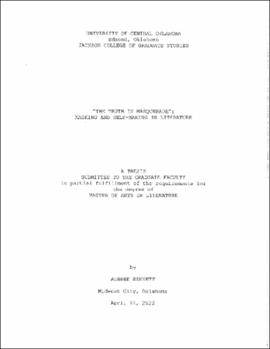| dc.contributor.advisor | Macey, J. David | |
| dc.contributor.author | Bennett, Aubree | |
| dc.date.accessioned | 2022-07-21T14:21:55Z | |
| dc.date.available | 2022-07-21T14:21:55Z | |
| dc.date.issued | 2022 | |
| dc.identifier.other | (AlmaMMSId)9982871409302196 | |
| dc.identifier.uri | https://hdl.handle.net/11244/335947 | |
| dc.description.abstract | This thesis analyzes scenes of “masquerade” in three literary texts, the Oresteia of Aeschylus (458 B.C.E.), Eliza Fowler Haywood’s short novel Fantomina; or Love in a Maze (1725), and Mark Twain’s A Connecticut Yankee in King Arthur’s Court (1889), to understand the complexity of characters who practice to deceive. The performances, or masks, of the protagonists in these texts are essential means of achieving otherwise unattainable goals. As at a masquerade, however, these masks are eventually taken away, leaving the characters in dire situations.This thesis draws upon literary-critical studies of its three primary texts as well as upon the work of social and cultural historians who have studied the gendered dynamics of performance, impersonation, and self-fashioning in ancient Greece, in eighteenth-century England, and in the nineteenth-century United States. The thesis uses the work of feminist historians and critics to contextualize Clytemnestra’s performative transgression of ancient Greek gender roles, the work of historians of eighteenth-century masquerade to analyze Fantomina’s role-playing, and medical discourses associated with post-Civil War traumatic stress to understand Hank Morgan’s response to his temporal dislocation from the nineteenth to the sixth century. This thesis documents the ways in which Clytemnestra’s actions prefigure the performative qualities of the masquerade long before the masquerade emerged as a distinct social practice. It argues that Fantomina’s varied masks represent an attempt, ultimately unsuccessful, to evade the restrictions imposed on upper-class women in eighteenth-century England and to claim a level of agency usually reserved to men. Twain’s “Connecticut Yankee” Hank, in turn, adopts a variety of masks to cope with trauma that, this thesis argues, recalls and reflects on the experiences of veteran amputees who sought, in the post-Civil War United States, to reclaim psychic wholeness. Much work remains to be done on masquerade as a recurrent trope in literature. This study aims to contribute to this important area of inquiry. Given further time, this study might be expanded to address representations of prostitution and masquerade in the visual arts, among other issues, as they complement or complicate literary representations of this topic. | |
| dc.rights | All rights reserved by the author, who has granted UCO Chambers Library the non-exclusive right to share this material in its online repositories. Contact UCO Chambers Library's Digital Initiatives Working Group at diwg@uco.edu for the permission policy on the use, reproduction or distribution of this material. | |
| dc.subject.lcsh | Aeschylus | |
| dc.subject.lcsh | Oresteia | |
| dc.subject.lcsh | Criticism and interpretation | |
| dc.subject.lcsh | Haywood, Eliza Fowler, 1693?-1756 | |
| dc.subject.lcsh | Fantomina; or, Love in a Maze | |
| dc.subject.lcsh | Twain, Mark, 1835-1910 | |
| dc.subject.lcsh | Connecticut Yankee in King Arthur's court | |
| dc.subject.lcsh | Identity (Psychology) in literature | |
| dc.subject.lcsh | Masquerades in literature | |
| dc.subject.lcsh | Disguise in literature | |
| dc.title | "The truth in masquerade": masking and self-making in literature | |
| dc.type | Academic theses | |
| dc.contributor.committeeMember | Huber, Kate | |
| dc.contributor.committeeMember | Quoss-Moore, Rebecca | |
| dc.thesis.degree | M.A., English Literature | |
| dc.subject.keywords | 18th century | |
| dc.subject.keywords | Clytemnestra | |
| dc.subject.keywords | Fantomina | |
| dc.subject.keywords | Mark Twain | |
| dc.subject.keywords | Masquerade | |
| dc.identifier.oclc | (OCoLC)1336941011 | |
| thesis.degree.grantor | Jackson College of Graduate Studies | |
